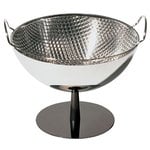Designed by renowned Italian designer Achille Castiglioni for Alessi, AC04 by is an elegant fruit bowl that also functions as a colander. A striking union of anthracite-coloured aluminium base and mirror-polished steel bowl, AC04 combines two classic household objects in a fresh and sophisticated way. At the age of 77, Castiglioni won the “Young Creator of the Year” award for the AC04 bowl at the Conseil National des Arts Culinaires de Paris.



AC04 fruit bowl/colander, steel
Alessi
Description
Designed by renowned Italian designer Achille Castiglioni for Alessi, AC04 by is an elegant fruit bowl that also functions as a colander. A striking union of anthracite-coloured aluminium base and mirror-polished steel bowl, AC04 combines two classic household objects in a fresh and sophisticated way. At the age of 77, Castiglioni won the “Young Creator of the Year” award for the AC04 bowl at the Conseil National des Arts Culinaires de Paris.
Product details (5)
- Material
- Mirror polished steel, foot in aluminium, colander in 18/10 stainless steel
- Colour
- Steel, anthracite
- Height
- 20.5 cm
- Diameter
- 25 cm
- Capacity
- 1.5 l
- Product ID
Designer
The Italian architect and designer Achille Castiglioni (1918-2002) is one of the greatest names of modern Italian design. His father was a notable Italian architect Giannino Castiglioni, and also his brothers Pier Giacomo and Livio worked with architecture and design. Achille and Pier Giacomo worked together as a designer pair until Pier Giacomo's death in 1968. Achille was awarded the prestigious Compasso d’Oro design award nine times during his career.
View all productsReviews (1)
5
Based on 1 reviews
-
M
Merja K
Kuopio, Finland
Olen käyttänyt tuota monta vuotta. Käytän sitä päivittäin. Se on lisäksi kaunis, joten sen paikka on näkyvissä tiskipöydällä. Huuhtelen/pesen siinä vihannekset ja hedelmät ja jätän valumaan. Näyttää hyvältä täynnä syksyn omenoita.
176 days ago
Sustainability
The Product Sustainability Framework, our criteria of sustainable design, helps you find the most sustainable products in our selection. Read below which sustainability criteria this product has met.
Working conditions & labour 8/9
-
Equal opportunities for all employees
-
Commitment to UN Global Compact, fair compensation for all employees
-
Corporate responsibility requirements defined and communicated for suppliers
-
Systematic work for improved inclusion and well-being in the workplace
-
Transparent supply chain
-
Suppliers' compliance to a code of conduct ensured
-
Direct suppliers audited and certified
-
Compliance to the UN Guiding Principles on Business and Human Rights ensured in the supply chain
Eco-friendly production 8/9
-
Fair and resource-wise water-use in production
-
No incineration or landfilling of returned items
-
No use of endangered species as materials
-
No direct environmental emissions or waste (excl. GHGs) from production
-
The sustainability of direct suppliers' production is addressed and monitored
-
Production and material sourcing that respect biodiversity, animal rights, and natural ecosystems
-
Material-efficient and ecological packaging
-
No potentially harmful chemicals used in own production
Climate impact 5/8
-
Company's direct greenhouse gas emissions identified and commitment to reduction
-
Product's carbon impact identified and commitment to reduction
-
Guidance on energy- and eco-efficient use of the product
-
Carbon footprint of the product calculated and goals set to reduce it
-
Carbon neutral or carbon negative product
Sustainable materials 5/6
-
Sustainable and long-lasting material choices
-
No harmful or hazardous substances
-
Responsible raw material sourcing and production
-
Materials suited for circularity: monomaterials, recyclable finishings, renewable or recycled contents etc.
-
Ecological materials: natural, biodegradable, recyclable or recycled contents
Circular design 5/5
-
High aesthetic quality promoting long-term use of the product
-
Technically durable product design and material choices
-
Design for enduring life-long quality
-
Design and support for product maintenance, repair and upgradability
-
Innovative circular design solutions: circular service system, resale platform, remanufacturing, collection of used products, etc.






